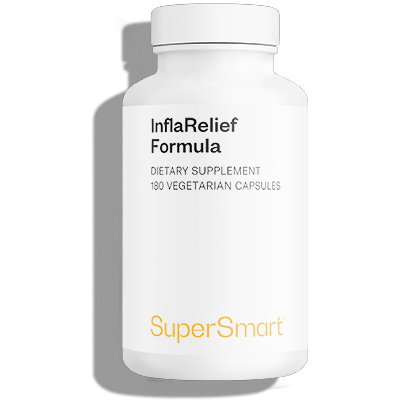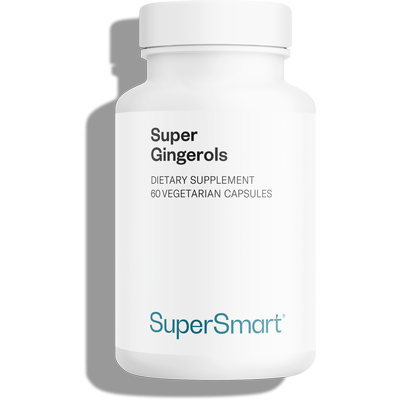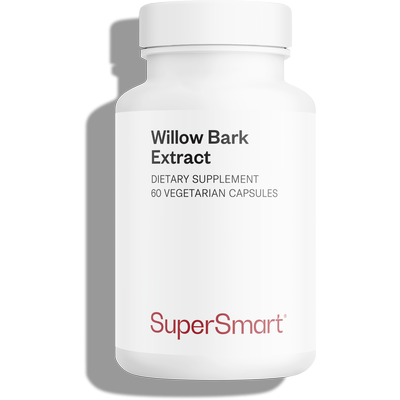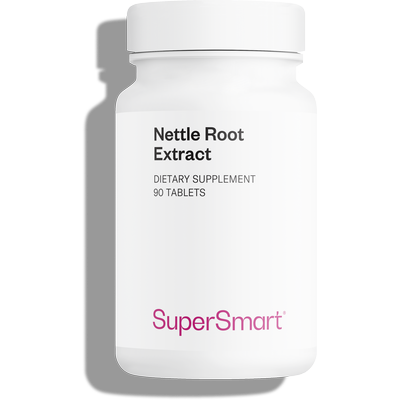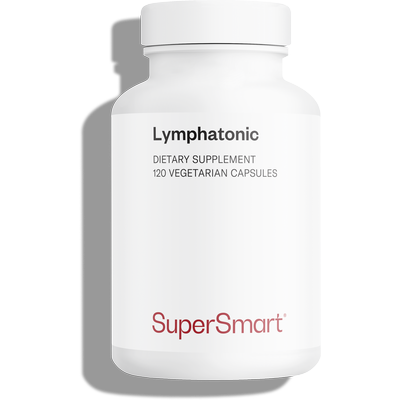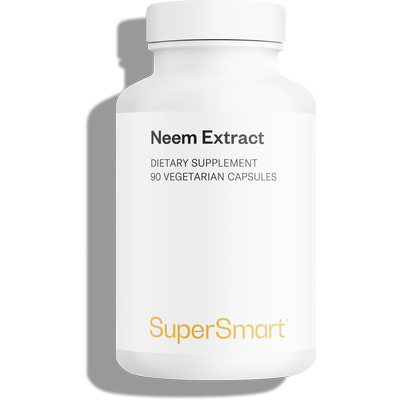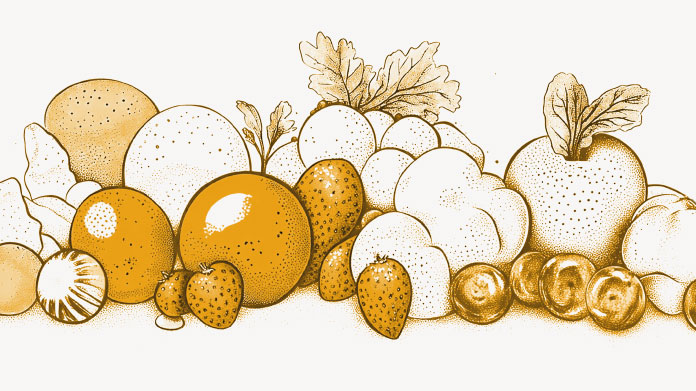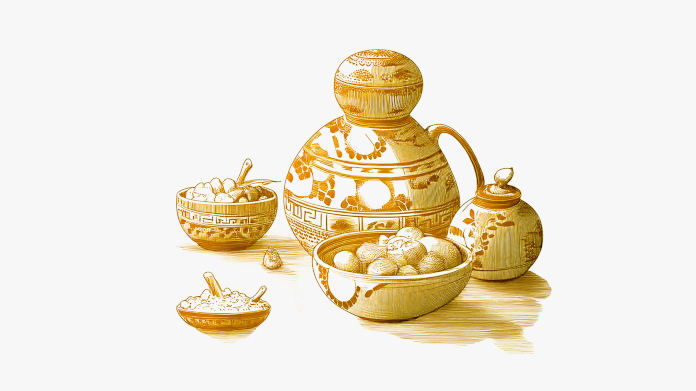10 natural and powerful anti-inflammatories
Muscle pain, sciatica, tendonitis … Whether acute or chronic, inflammation can be very painful. Here are 10 tried-and-tested natural anti-inflammatories.
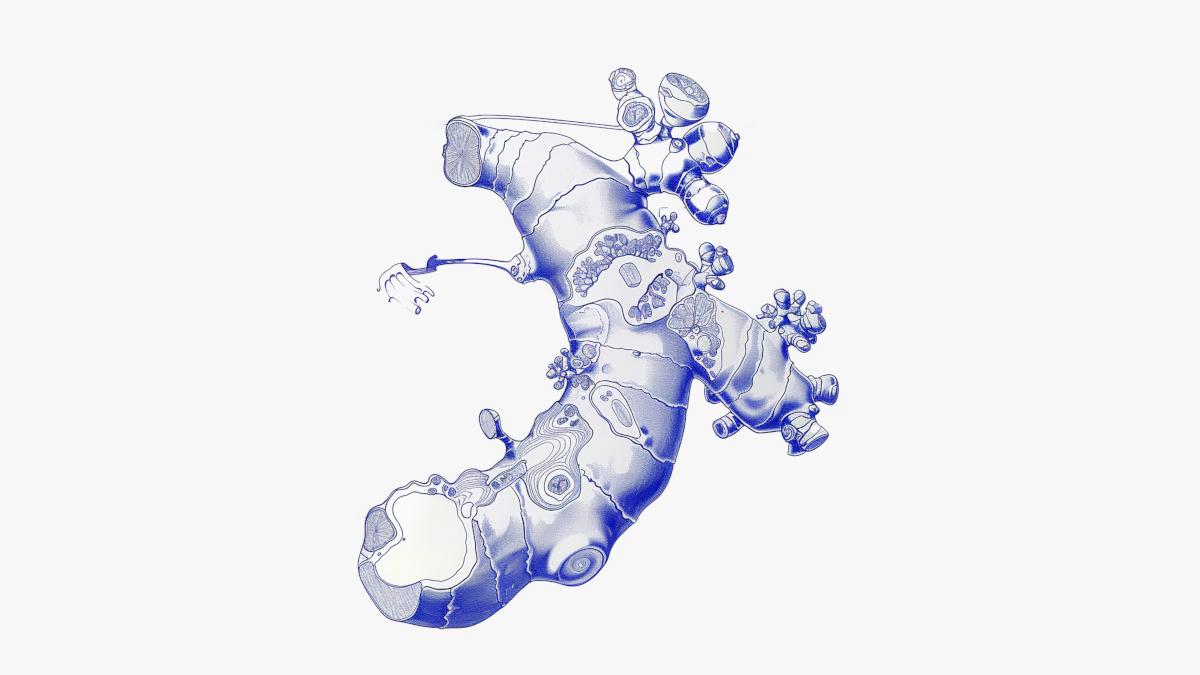
Reminder: what exactly is inflammation?
Inflammation is a natural process, triggered by the body’s immune system in response to an attack (viruses, bacteria, allergens, injuries…), to repair damaged tissue or eliminate potential pathogens (1).
In its acute phase, it manifests in various symptoms such as redness, swelling or localised pain. Often silent and thus more insidious, chronic inflammation persists over time: it is associated with many disorders, such as metabolic and auto-immune diseases, as well as rheumatic conditions (like osteoarthritis) (2).
Alongside prioritising certain foods in your diet (red berries, broccoli, oily fish …) and controlling your stress levels (3), natural solutions are available that can help boost your resistance to inflammation.
Ginger, a natural anti-inflammatory studied in osteoarthritis
Several studies have demonstrated the benefits and safety of ginger (Zingiber officinale) in individuals suffering from rheumatism and osteoarthritis problems (4). Subjects have reported reduced pain, swelling and functional impairment in daily activities.
Documented since the 1970s, its ability to inhibit the production of various inflammatory mediators, including leukotrienes and prostaglandins, is thought to be responsible for its anti-inflammatory effect (5). More recently, researchers also appear to have detected an ability to block the expression of certain genes involved in inflammatory processes including those encoding the COX-2 enzyme (6).
Ginger can obviously be used in cooking, but it is also available in a more concentrated form in dietary supplements (such as in Super Gingerols, a ginger extract standardised to 20% gingerols).
Blackcurrant, a regulator of skin and respiratory inflammation
Blackcurrant leaves (Ribes nigrum) constitute another natural anti-inflammatory. Scientists believe their effects come from their flavonols which appear to interfere with IFN-γ signalling , on which the immune response and regulation of inflammation depend. The potential of blackcurrant leaves in easing skin and respiratory conditions is currently being explored (7).
White willow, aspirin’s ancestor
Medicinal use of white willow bark (Salix alba) is by no means recent. It dates back to 500 BC when it was used by the Chinese for reducing fever and relieving pain (8). It contains salicin, metabolised in the body into salicylic acid, which actually makes it the precursor of today’s aspirin (one of the class of non-steroidal anti-inflammatory drugs).
It has now been introduced into certain supplements (such as Willow Bark Extract standardised to 15% salicin).
Meadowsweet, the natural anti-inflammatory for muscles and joints
Meadowsweet (Filipendula ulmaria) also produces salicylic acid in its flowerheads. In fact, it is from its other name, ‘spiraea’, that we get the name ‘aspirin’.
Traditionally popular for relieving headaches and muscle and joint pain, this potent analgesic and natural anti-inflammatory has been shown in vitro to inhibit the COX-2 enzyme as well as the NF-κB signalling pathway, the immune response ‘switch’ (9).
Its many phenolic compounds (including flavonoid glycosides), which are not absorbed by the gut, appear to be bio-converted by the intestinal microbiota, potentially maximising its efficacy.
Turmeric, a recognised anti-inflammatory ingredient
A much-prized root in Ayurvedic medicine, turmeric (Curcuma longa) enjoys remarkable antioxidant and anti-inflammatory properties as a result of its concentration in curcumin, and more generally, curcuminoids. A number of studies suggest these compounds bind to Toll-like receptors to regulate inflammation signalling pathways. At a cellular level, they are thought to also reduce pro-inflammatory molecules including interleukins and TNF-α factor (10).
They are, however, poorly absorbed in the gut, so it’s important to choose a supplement which makes up for this (such as Super Curcuma, in which the curcuminoids are combined with natural phosphatidylcholine to produce a level of absorption 29 times higher than other such supplements on the market) (11).
Boswellia, an ally for joint health
The resin of Boswellia serrata, also known as ‘Indian Frankincense’, is notable for its boswellic acids which are believed to be responsible for its therapeutic benefits. In particular, boswellia serrata supports joint health (as shown in a study on arthritic rats) as well as respiratory and gastro-intestinal function (12).
AKBA appears to be the most active of these boswellic acids at inhibiting an enzyme called 5-LO, which is involved in the inflammatory cascade (that’s why the highly-absorbable supplement Super Boswellia is standardised to 20% AKBA) (13).
Neem, the natural anti-inflammatory for the skin
Neem, or margosa (Azadirachta indica), has a triple antioxidant, anti-inflammatory and anti-pyretic effect(14). Designated a ‘cure-all’ in Ayurvedic medicine, it supports, amongst others, the skin’s natural defences.
More specifically, its purifying and detoxifying properties soothe skin that’s prone to allergic reactions or acne (15). It’s used in powder form for home-made skincare/cosmetics as well as in supplement form (such as Neem Extract, which offers a dose of 500 mg of Azadirachta indica extract per capsule).
Nettle, potential relief for joint inflammation
Though negatively associated with uncomfortable stinging, the common nettle or Urtica dioica (the key ingredient in Nettle Root Extract) has actually been shown to be, amongst others, a first-rate natural anti-inflammatory. Containing malic and caffeic acids, polysaccharides and flavonoids, its leaves inhibit the production of prostaglandins, thromboxane, interleukins IL-2 and IL-1, interferon (IFN) and tumour necrosis factor (16).
A number of studies are therefore investigating its effects in the area of acute and chronic rheumatism (17).
Sweet clover, an anti-inflammatory for vascular health
Supporting the vascular and venous systems, sweet clover (Melilotus officinalis) also has an anti-inflammatory effect as a result of its unique combination of coumarin, phenolic acids, flavonoids and saponins (18). More specifically, it helps combat inflammation related to veno-lymphatic disorders (the natural venotonic supplement Lymphatonic is based on a sweet clover extract standardised to 18% coumarin for enhanced efficacy) (19).
Roman chamomile, the digestive relaxant
Rich in flavonoids, Roman chamomile (Chamaemelum nobile) is prized for its digestive and soothing properties, especially for relieving irritation of the gastric mucosa and throat. Studies have focused on its interaction with nitric oxide (NO), which in excess becomes pro-inflammatory (20).
Which is the most effective natural anti-inflammatory?
If you’re looking to fully restore your internal balance, it’s probably best to choose a broad spectrum supplement that combines various compounds for a synergistic effect (the product InflaRelief contains 12, carefully-selected, 100% natural compounds, including 3 patented ingredients, as well as a range of the anti-inflammatory substances mentioned above: turmeric, nettle, ginger…)
SUPERSMART ADVICE
References
- Stone WL, Basit H, Burns B. Pathology, Inflammation. [Updated 2022 Nov 14]. In: StatPearls [Internet]. Treasure Island (FL): StatPearls Publishing; 2023 Jan-. Available from: https://www.ncbi.nlm.nih.gov/books/NBK534820/
- Pahwa R, Goyal A, Jialal I. Chronic Inflammation. [Updated 2022 Aug 8]. In: StatPearls [Internet]. Treasure Island (FL): StatPearls Publishing; 2023 Jan-. Available from: https://www.ncbi.nlm.nih.gov/books/NBK493173/
- Liu YZ, Wang YX, Jiang CL. Inflammation: The Common Pathway of Stress-Related Diseases. Front Hum Neurosci. 2017 Jun 20;11:316. doi: 10.3389/fnhum.2017.00316. PMID: 28676747; PMCID: PMC5476783.
- Bartels EM, Folmer VN, Bliddal H, Altman RD, Juhl C, Tarp S, Zhang W, Christensen R. Efficacy and safety of ginger in osteoarthritis patients: a meta-analysis of randomized placebo-controlled trials. Osteoarthritis Cartilage. 2015 Jan;23(1):13-21. doi: 10.1016/j.joca.2014.09.024. Epub 2014 Oct 7. PMID: 25300574.
- Srivastava KC, Mustafa T. Ginger (Zingiber officinale) in rheumatism and musculoskeletal disorders. Med Hypotheses. 1992 Dec;39(4):342-8. doi: 10.1016/0306-9877(92)90059-l. PMID: 1494322.
- Grzanna R, Lindmark L, Frondoza CG. Ginger--an herbal medicinal product with broad anti-inflammatory actions. J Med Food. 2005 Summer;8(2):125-32. doi: 10.1089/jmf.2005.8.125. PMID: 16117603.
- Magnavacca A, Piazza S, Cammisa A, Fumagalli M, Martinelli G, Giavarini F, Sangiovanni E, Dell'Agli M. Ribes nigrum Leaf Extract Preferentially Inhibits IFN-γ-Mediated Inflammation in HaCaT Keratinocytes. Molecules. 2021 May 20;26(10):3044. doi: 10.3390/molecules26103044. PMID: 34065200; PMCID: PMC8160861.
- Shara M, Stohs SJ. Efficacy and Safety of White Willow Bark (Salix alba) Extracts. Phytother Res. 2015 Aug;29(8):1112-6. doi: 10.1002/ptr.5377. Epub 2015 May 22. PMID: 25997859.
- Van der Auwera A, Peeters L, Foubert K, Piazza S, Vanden Berghe W, Hermans N, Pieters L. In Vitro Biotransformation and Anti-Inflammatory Activity of Constituents and Metabolites of Filipendula ulmaria. 2023 Apr 20;15(4):1291. doi: 10.3390/pharmaceutics15041291. PMID: 37111776; PMCID: PMC10146082.
- Peng Y, Ao M, Dong B, Jiang Y, Yu L, Chen Z, Hu C, Xu R. Anti-Inflammatory Effects of Curcumin in the Inflammatory Diseases: Status, Limitations and Countermeasures. Drug Des Devel Ther. 2021 Nov 2;15:4503-4525. doi: 10.2147/DDDT.S327378. PMID: 34754179; PMCID: PMC8572027.
- Xie J, Li Y, Song L, Pan Z, Ye S, Hou Z. Design of a novel curcumin-soybean phosphatidylcholine complex-based targeted drug delivery systems. Drug Deliv. 2017 Nov;24(1):707-719. doi: 10.1080/10717544.2017.1303855. PMID: 28436718; PMCID: PMC8241017.
- Siddiqui MZ. Boswellia serrata, a potential antiinflammatory agent: an overview. Indian J Pharm Sci. 2011 May;73(3):255-61. doi: 10.4103/0250-474X.93507. PMID: 22457547; PMCID: PMC3309643.
- Sailer ER, Subramanian LR, Rall B, Hoernlein RF, Ammon HP, Safayhi H. Acetyl-11-keto-beta-boswellic acid (AKBA): structure requirements for binding and 5-lipoxygenase inhibitory activity. Br J Pharmacol. 1996 Feb;117(4):615-8. doi: 10.1111/j.1476-5381.1996.tb15235.x. PMID: 8646405; PMCID: PMC1909340.
- Alzohairy MA. Therapeutics Role of Azadirachta indica (Neem) and Their Active Constituents in Diseases Prevention and Treatment. Evid Based Complement Alternat Med. 2016;2016:7382506. doi: 10.1155/2016/7382506. Epub 2016 Mar 1. PMID: 27034694; PMCID: PMC4791507.
- Rajaiah Yogesh H, Gajjar T, Patel N, Kumawat R. Clinical study to assess efficacy and safety of Purifying Neem Face Wash in prevention and reduction of acne in healthy adults. J Cosmet Dermatol. 2022 Jul;21(7):2849-2858. doi: 10.1111/jocd.14486. Epub 2021 Sep 30. PMID: 34590784.
- Bhusal KK, Magar SK, Thapa R, Lamsal A, Bhandari S, Maharjan R, Shrestha S, Shrestha J. Nutritional and pharmacological importance of stinging nettle (Urtica dioica L.): A review. Heliyon. 2022 Jun 22;8(6):e09717. doi: 10.1016/j.heliyon.2022.e09717. PMID: 35800714; PMCID: PMC9253158.
- Dhouibi R, Affes H, Ben Salem M, Hammami S, Sahnoun Z, Zeghal KM, Ksouda K. Screening of pharmacological uses of Urtica dioica and others benefits. Prog Biophys Mol Biol. 2020 Jan;150:67-77. doi: 10.1016/j.pbiomolbio.2019.05.008. Epub 2019 Jun 1. PMID: 31163183.
- Liu YT, Gong PH, Xiao FQ, Shao S, Zhao DQ, Yan MM, Yang XW. Chemical Constituents and Antioxidant, Anti-Inflammatory and Anti-Tumor Activities of Melilotus officinalis (Linn.) Molecules. 2018 Jan 29;23(2):271. doi: 10.3390/molecules23020271. PMID: 29382154; PMCID: PMC6017420.
- Jasicka-Misiak I, Makowicz E, Stanek N. Polish Yellow Sweet Clover (Melilotus officinalis L.) Honey, Chromatographic Fingerprints, and Chemical Markers. Molecules. 2017 Jan 15;22(1):138. doi: 10.3390/molecules22010138. PMID: 28098847; PMCID: PMC6155788.
- Bhaskaran N, Shukla S, Srivastava JK, Gupta S. Chamomile: an anti-inflammatory agent inhibits inducible nitric oxide synthase expression by blocking RelA/p65 activity. Int J Mol Med. 2010 Dec;26(6):935-40. doi: 10.3892/ijmm_00000545. PMID: 21042790; PMCID: PMC2982259.
Keywords
2 Days
Service Satisfaction
I’m satisfied with the service; it fulfilled what it set out to do.
Anfhony Abreu
5 Days
Original product and fast delivery
Original product and fast delivery. I haven't started it yet, but will do soon.
Vincenza Catania
8 Days
Good quality
Good quality. Good service.
Leonel Guzman
10 Days
Top!!!!!!!!
Top!!!!!!!!
Michael
12 Days
Excellent!
Products are great and delivered fast!
PARDINI Debora
12 Days
From order to receive the product
From order to receive the product, the process is smooth & fast. It’s good to customers.
WONG Mei Ling
13 Days
Fast delivery
very quick delivery to italy. product is good.
Customer
15 Days
Prompt delivry !!👍
Prompt delivry !!👍
SWEET Christine
15 Days
Good delivery and flawless quality
AS far as delivery and the visual quality are concerned, Supersmart is excellent. I will not comment on the efficacy of the products themselves, since that is only possible over a longer period and in a large customer base compared to people who do not consume a particular product.
Roger De Backer
16 Days
Perfect services
Perfect services, perfect support, great articles about products
Michaela Alali Beitlová
17 Days
Great experience and effective supplements
I’ve purchased many types of supplements from this company over the course of years to treat a few issues, and I’m satisfied with their quality. After using them consistently for a period of time, I can say they met my expectations and I could feel real health benefits that built up over time. Deliveries are always quick. I recommend this company to anyone looking for high-quality supplements.
Giordano
17 Days
Es hat alles gestimmt
Es hat alles gestimmt. Top
marina thieme
20 Days
Great product
Great product, but still evaluating its effectiveness. Highly recommended. Super efficient delivery.
Chalise
24 Days
Quality products
Quality products , efficient and effective customer service. You can’t ask more
CLaudia
30 Days
Good quality product and customer service.
So far, I'm liking this product, and the customer service was very good.
ELZL
of experience
your money back
##montant## purchase

